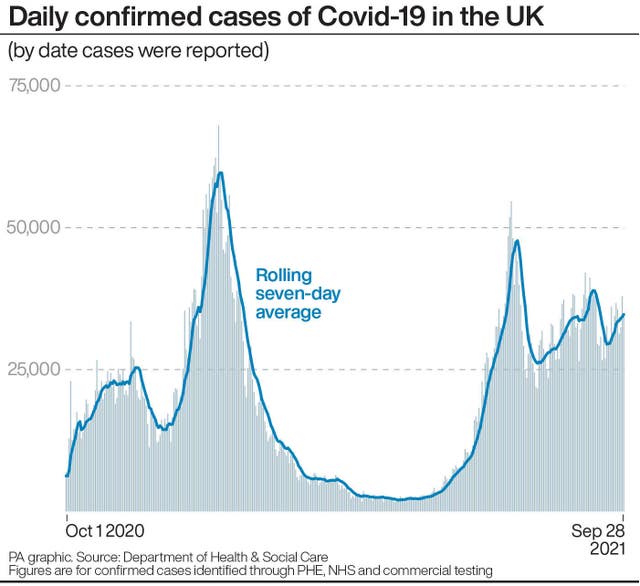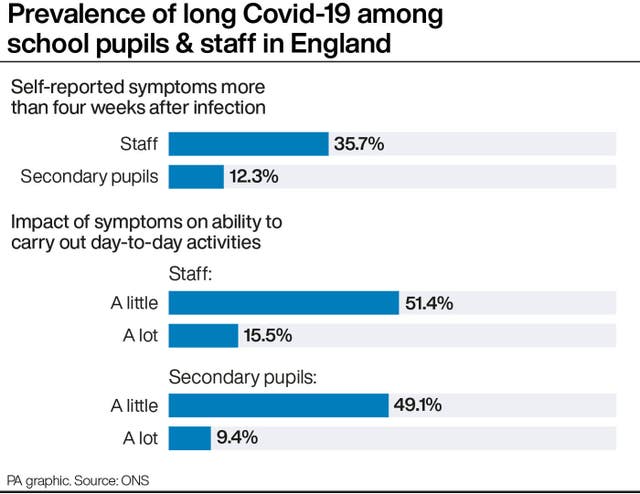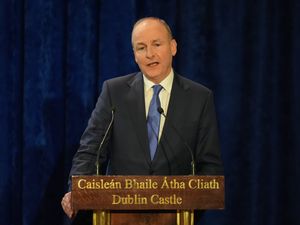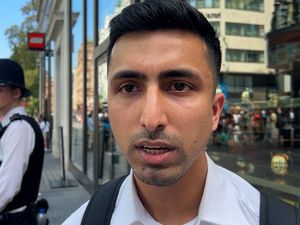Thousands of long Covid cases could be averted if children get two jabs – study
The benefits of offering a second jab to 12 to 17-year-olds outweigh the risks, researchers have claimed.

Giving children two doses of a coronavirus vaccine could potentially prevent thousands of cases of long Covid, a new study has suggested.
Children as young as 12 in the UK are now eligible for their first shot of the Pfizer Covid-19 vaccine.
However, vaccination experts are yet to advise if and when children should get the full course – or two doses.
The new study saw researchers conduct a risk/benefit analysis of teenagers aged 12 to 17 getting both doses of the vaccine.
Researchers used historic rates of hospital admission, intensive care support and death among children in England who had Covid-19.

They also examined estimates of long Covid and looked at vaccine efficacy rates and the potential risk of heart inflammation linked to the jab, also known as vaccine-induced myocarditis.
Their study, published in the Journal of the Royal Society of Medicine, suggests the benefits of getting a second jab outweigh the risks “unless case rates are sustainably low”.
As of September 15, around 680 out of every 100,000 10 to 19-year-olds were catching Covid-19 every week.
If this soars to 1,000 per week over a 16-week period, then full vaccination of 12 to 17-year-olds will “avert 4,430 hospital admissions and 36 deaths over 16 weeks”, they estimated.
If cases plummet to 50 per week then “vaccination could avert 70 hospital admissions and two deaths over 16 weeks,” they added.
“The benefit of vaccination in terms of hospitalisations in adolescents outweighs risks unless case rates are sustainably very low (below 30/100,000 teenagers/week).
“Given the current high case rates in England, our findings support vaccination of adolescents against SARS-CoV2.”
The study also suggests that thousand of potential cases of long Covid could be averted.
It made different estimates based on different assumed rates of long Covid – from an estimate that 14% of children have prolonged symptoms after infection to 2% of children suffering continuing symptoms.
The authors said that vaccination would “avert 56,000, 16,000, or 8,000 cases in 12 to 17-year-olds assuming incidence rates of 14%, 4%, and 2% respectively.”
On Tuesday, data from a small study of schools in England suggested that more than one in 10 secondary school pupils have suffered ongoing symptoms after infection.
The survey from the Office for National Statistics (ONS) estimates that 12.3% of secondary school pupils with a previously confirmed Covid-19 infection reported experiencing ongoing symptoms more than four weeks from the start of the infection.

Some 9.4% said their ability to carry out day-to-day activities had been significantly reduced, according to the ONS study.
The authors of the latest research also examined the potential complication of heart inflammation among a small number of young people who had received the vaccine, but they said the cases were “rare” and a “typically mild complication”.
They conclude: “Our conservative analysis shows that the benefits of offering two doses of vaccine to all 12 to 17-year-olds clearly outweigh the risks to the children concerned in both the current context and in scenarios with substantially lower case incidence rates.
“The real-world short-term risks from vaccination in over 12 million under-18s who have been vaccinated around the world have been found to be minimal, with myocarditis being a rare, and typically mild complication.”
Lead author, Dr Deepti Gurdasani, of Queen Mary University of London, said: “This analysis shows that, on clinical risks alone, vaccination is warranted for 12 to 17-year-olds in England.
“While we wait to understand the long-term effects of Covid-19 on children, the precautionary principle advocates for protecting all children from exposure to this virus and vaccination is a crucial part of that protection.”





